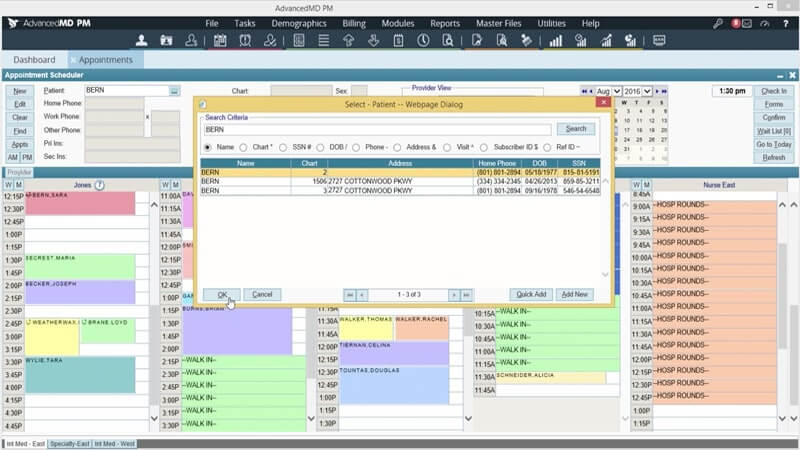End-of-Year Sale: Subscribe by December 31 to Get 3 Months Free!
Learn More
Table of Contents

Experience Better Practice Management Today!
Starting at $28.05/month
No Credit Card Required

Experience Better Practice Management Today!
Starting at $30/month
No Credit Card Required
Running a healthcare practice means dealing with more than patient care. Billing errors, rejected insurance claims, and admin delays drain your time and money. The US healthcare system bleeds up to $5 million weekly from billing mistakes alone.
The right medical billing software stops these costly problems. It cuts administrative headaches, speeds up claim submissions, and improves your cash flow. Pick the right solution, and you spend more time with patients and less time buried in paperwork.
This guide breaks down the top 8 medical billing software tools that simplify your practice's billing. Solo practitioner or a larger clinic, there's a solution built for how you work.
We’ve compiled a list of the top medical billing software options after extensive research through forums and firsthand feedback from practices. These tools stand out based on real-world performance and user experience.
Here’s a sneak peak first:
| Tool Name | Best For | Capterra Rating | Pricing |
| Noterro | Billing, insurance, practitioner management | 4.5/5 | Starts at $28.05/month (14-day free trial) |
| AdvancedMD | Claims management | 4.3/5 | Custom pricing |
| EZClaim | Partnering with EHR systems | 4.1/5 | Starts at $169/month/single user |
| PracticeSuite | Unified, synchronised workflow | 4.2/5 | Custom pricing |
| eClinicalWorks | Billing, financial reporting | 4.5/5 | Starts from $599/month/provider |
| DrChrono | Flexible billing, mobile access | 4.6/5 | Custom pricing |
| CareCloud | Revenue cycle management | 4.3/5 | Custom pricing |
| CollaborateMD | Billing & electronic claim submission | 4.0/5 | Starts at $255/month |

Noterro is an all-in-one medical billing platform that cuts through billing complexity for healthcare practices. From insurance claim management to payment processing, it's built to streamline tasks, reduce admin work, and boost cash flow. Integration with TELUS eClaims and Availity makes it work smoothly for both private pay and insurance billing.
Additionally, its features for membership management, AI note-taker, and many more make it a versatile and reliable tool for practices of all sizes.
Features:
Pros:
Cons:
Capterra Rating: 4.8/5
Pricing: Starts at $28.05/month with a 14-day free trial.
Best for: Solo clinics, small teams, and allied health providers who want an all-in-one solution for billing, insurance claims, and mobile access to manage patient records seamlessly.
Also Read: How to Handle Billing, Insurance, Cards & More As a New Practitioner

AdvancedMD tackles medical billing from every angle. It automates the tedious stuff and keeps claims, payments, and patient data organized. Real-time tracking, denial management, and solid reporting give you control. EHR integration means it plugs into practices of any size without drama.
Features:
Pros:
Cons:
Capterra Rating: 4.3/5
Pricing: Custom pricing available upon request.
Best for: Larger practices or multi-location setups that need robust claims management, real-time tracking, and EHR integration to streamline their billing and improve operational efficiency.

EZClaim targets small to mid-sized practices that need billing software without the hefty price tag. It handles claim management, patient billing, and reporting in ways that save time and reduce mistakes. The interface won't confuse your staff, and it links up with multiple clearinghouses. Good option if you want billing that works without the learning curve.
Features:
Pros:
Cons:
Capterra Rating: 4.1/5
Pricing: Starts from $169/month/single user.
Best for: Small to mid-sized practices that need a straightforward, affordable billing solution with multi-clearinghouse integration.

PracticeSuite is highly customizable medical billing software for practices with specific billing needs. It integrates smoothly with EHR and patient scheduling systems to keep operations running clean. Claim submission, patient statements, and collection tracking all live in one place. The flexibility helps practices that can't squeeze into cookie-cutter billing solutions.
Features:
Pros:
Cons:
Capterra Rating: 4.2/5
Pricing: Custom pricing available upon request.
Best for: Large practices or multi-location setups that need customizable billing workflows and seamless integration with existing EHR and scheduling systems.

eClinicalWorks gets a lot of use in healthcare because it plugs straight into EHR systems. Scheduling, charting, billing, and insurance claims all run through one platform. Larger practices and healthcare networks lean on it because it grows with them and handles the complex stuff without breaking.
Features:
Pros:
Cons:
Capterra Rating: 4.5/5
Pricing: Starts from $599/month/provider.
Best for: Larger practices or healthcare networks that require scalable solutions, EHR integration, and advanced reporting to streamline billing and improve operational efficiency.

DrChrono offers a flexible medical billing solution with strong mobile access for practices seeking to streamline billing, practice management, and electronic health records. This cloud-based solution is ideal for practices that need flexibility and scalability, particularly for mobile or telemedicine-based care.
Features:
Pros:
Cons:
Capterra Rating: 4.6/5
Pricing: Custom pricing available upon request.
Best for: Practices that need flexibility, especially mobile care providers or telemedicine services, with the ability to manage billing, scheduling, and patient records from anywhere.

CareCloud runs cloud-based medical billing that modernises how healthcare providers handle their money. Automated claims processing, patient billing, and integrated reporting help practices improve revenue cycles and lighten admin workload. The interface is simple to use, and cloud access means you can pull up data from anywhere.
Features:
Pros:
Cons:
Capterra Rating: 4.3/5
Pricing: Custom pricing available upon request.
Best for: Practices focused on improving revenue cycle management with cloud-based billing solutions and real-time reporting.

CollaborateMD cuts through billing complexity for small to mid-sized practices. The tools handle patient billing, claims, and payments without creating chaos. Real-time claim tracking, automated patient billing, and denial management keep things moving. Multi-user access lets growing teams work on billing together without collisions or confusion.
Features:
Pros:
Cons:
Capterra Rating: 4.0/5
Pricing: Starts at $255/month.
Best for: Small to mid-sized practices that need affordable billing software with real-time claim tracking and multi-user access for team collaboration
Bonus read: 16 Practice Management Software Features Chiropractors Shouldn’t Ignore
Choosing the right medical billing software doesn’t have to be overwhelming. Keep these key factors in mind:
Involve your team—practitioners, admins, and billing staff—in the decision-making process. Their input can help you find the best fit for your practice!
Bonus Read: 11 Billing Tips for Mobile & Multi Practitioner & Location Clinics
Unreliable billing can cause major headaches for the practitioners. Investing in a reliable medical billing platform can transform your clinic’s operations, reducing errors and saving valuable time.
Here are the reasons why:

Helpful read: 9 Chiropractic Billing & Coding Red Flags (And How to Avoid Them)
Need an all-in-one solution that handles billing, insurance claims, and patient scheduling without complexity? Noterro works for solo practitioners and small clinics that need reliable software without the massive price tag. It links up with Square, QuickBooks, and Xero without fighting you. Manage your practice from your couch, your car, or wherever you happen to be.
Running a larger practice or dealing with complex billing workflows? AdvancedMD delivers deep customisation and powerful claims management. It's built for practices needing robust EHR integration, real-time claim tracking, and detailed reporting. Multiple locations or intricate billing requirements? AdvancedMD handles it.
Small practice or just starting with billing software? EZClaim offers affordability and simplicity. Designed for small to mid-sized practices that need straightforward tools without the bells and whistles. Multi-clearinghouse integration and customizable statements keep billing running smoothly on a budget.
Pick what fits your practice. Size matters, complexity matters, and your specific headaches matter most. Run the free trials, see which one actually makes your day easier, and choose whatever stops billing from eating your time. The right tool means less paperwork chaos and more hours with actual patients.
There are four main types - Standalone Billing Software which focuses on billing and requires integration with other systems, Integrated Practice Management Software which combines billing with scheduling, patient registration, and EHR, Cloud-Based Medical Billing Software which can be accessed online, offering flexibility and automatic updates and EHR-Integrated Billing Software which syncs billing with EHR systems to improve accuracy and efficiency.
Noterro ensures data security by being fully compliant with PIPEDA and HIPAA standards. With robust encryption and secure cloud infrastructure, your patient and billing data are protected and handled with the highest level of confidentiality.
Look for tools that offer simple onboarding, low monthly pricing, and features you’ll use daily. Avoid platforms built for hospitals or large clinics, because they often include unnecessary complexity and higher costs.
Most billing platforms, including Noterro, provide import tools or migration support. You can usually upload client lists, treatment codes, invoices, and insurance information with a guided setup. Reach out to us if you need help. Our experts will help with free migration support.
Most systems have built-in error checks that validate codes, missing fields, and payer-specific rules before you submit a claim. This prevents avoidable rejections and improves your first-pass acceptance rate.
Most tools like Noterro offer short tutorials, knowledge bases, and chat support. Front-desk staff usually adapt within a week because interfaces are designed for non-technical users.
Tags



